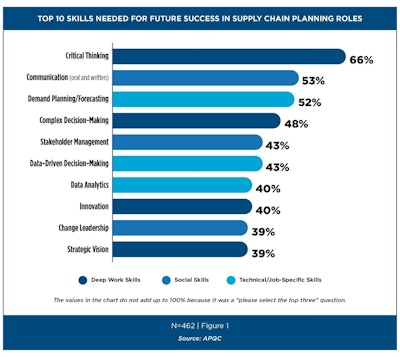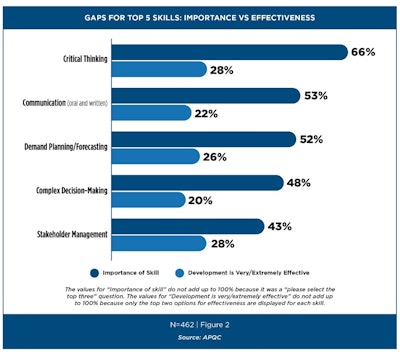
Today’s supply chain planners are asked to lead complex, cross-functional initiatives, drive automation, and build more agile and responsive supply chains. Yet many organizations are overlooking the broader mix of skills required to navigate today’s challenges.
To better understand how organizations can develop the next generation of supply chain planning talent, APQC collaborated with Dr. Dan Pallathy, assistant professor of practice and director of operations, University of Tennessee, Knoxville, for a global survey of 462 global supply chain planning professionals. Here’s an outline of the key findings on the skills vital for supply chain planning success and where organizations are falling short at developing them.
Top skills for supply chain planning
To master their craft, supply chain planners need to develop a strong mix of skills across three domains:
1. Deep work skills enable individuals to focus without distraction on complex, cognitively demanding tasks. These skills support analytical thinking, sustained concentration, and problem-solving, particularly in high-stakes environments.
2. Social skills include the ability to collaborate effectively, set and communicate strategic direction, and lead organizational change.
3. Technical and job-specific skills encompass specialized supply chain planning competencies like demand forecasting as well as general business acumen.
When asked about the skills needed for future success in supply chain planning, respondents identified skills from all three of these broader categories.
 APQC
APQC
Critical thinking. Critical thinking is the top supply chain planning skill by a wide margin. Supply chain planners often need to evaluate competing sources of information, ask incisive questions to clarify issues, and develop informed perspectives related to sales and production data. These skills are invaluable not only for crafting forward-looking plans but also for course correcting when circumstances change.
Communication. Whether presenting the demand plan or conducting a tactical business review, planners must have a strong sense of the story they want to tell and an ability to connect that story to the broader goals and values of their audiences. Multifunctional business processes like sales and operations planning also require planners to have strong facilitation skills that incorporate other perspectives.
Demand planning/forecasting. Demand planning and forecasting go well beyond building future projections based on past outcomes. Supply chain planners today also need to analyze complex buying behaviors and provide guidance on demand for specific products and/or services.
AI is increasingly playing a role in demand forecasting and helping organizations achieve a greater degree of forecast accuracy. This doesn’t negate the importance of demand planning and forecasting skills. Organizations still need experts both to prepare AI inputs and ensure the validity of AI outputs.
Complex decision-making. Complex decision-making skills enable supply chain planners to evaluate multiple options to determine the best course of action for situations where there is not one “right answer.” This skill often comes into play when monitoring and managing multiple scenarios, seeking consensus, and forecasting. When plans do not sync with real world events, planning professionals need to know when and how to reassess plans, repair relationships, and move forward with confidence.
Stakeholder management. Stakeholder management involves identifying and communicating with internal and external stakeholders, determining their needs and goals, and influencing them toward a desired outcome. Successful supply chain planners negotiate and collaborate with different audiences, often bridging disconnected budgets, competing measures, and resistance to standardization. This skillset is essential for building trust and solving problems both across the supply chain and across the enterprise more broadly.
Organizations are falling short in skills development
Supply chain planners have a good understanding of the skills they need for success. The challenge is that in many cases, they may not be getting opportunities to develop them. The study found sizeable gaps between the importance that respondents placed on each of the Top 10 skills and the degree to which they feel that their organizations are effective at developing them among employees.
 APQC
APQC
While critical thinking was the top supply chain planning skill, only 28% of respondents said their organizations were effective at helping employees develop this skill. Other skills like communication, demand planning and forecasting, and complex decision-making also show large gaps between importance and effectiveness.
These skills take time to develop and are impossible to acquire without practical experience, commitment, and support. They are also difficult to teach in a formal classroom-based setting. Low effectiveness ratings across all these skills mean that organizations have opportunities to think more broadly and creatively about their learning and development approaches for supply chain planning.
How organizations develop supply chain planning talent
The study found that three-fourths of respondents (76%) use stretch assignments to develop supply chain planning talent. Job rotations within supply chain (69% of respondents) and job shadowing (65%) are also popular approaches that can all help supply chain planners gain new skills in the flow of work.
Other approaches that could potentially be very effective are underutilized. For example, mentors can help junior supply chain planners to sharpen key skills like communication and forecasting, but only 39% of surveyed organizations have mentoring programs in place for supply chain planning. Fewer than one-third of respondents (32%) offer job rotations outside of supply chain, which would provide opportunities for planners to connect with stakeholders, build networks, and gain new perspectives.
3 key takeaways and a call to action
It is encouraging to see that a large majority of organizations are utilizing at least a few methods that go beyond the classroom or online learning modules to help employees build supply chain planning skills. However, low effectiveness ratings for developing these skills mean that organizations still need to rethink how they cultivate supply chain planning talent. Below are three recommendations for how to move forward and a call to action for supply chain planners.
Manage talent development within supply chain. Supply chain planning talent programs are more effective when housed within the supply chain or planning function. Keeping these programs closer to the front lines increases responsiveness to changing realities on the ground. As you make the business case for these programs, frame the conversation around value generation and risk mitigation rather than the time and costs required.
Provide for a diverse range of learning styles. Survey your supply chain planners or use informal interviews and focus groups to find out more about their learning styles, their career aspirations, and the types of learning opportunities they would find most engaging. Leveraging a broad range of approaches to learning will help your people grow their skills while meeting diverse learning needs.
Measure learning outcomes. Identify measures that leaders care about, like lower cycle times, lower costs, or higher revenue, and tie these measures to outcomes from learning and development for supply chain planning. Tracking these measures alongside employee and manager feedback will help identify which learning methods simply aren’t delivering so you can change course if needed.
Supply chain planners: Take charge of your own professional development
If your organization isn’t providing the right training for you as a supply chain planner, waiting and hoping that they will is not a good professional development plan. Take advantage of the opportunities that you can find within and outside of your organization and make your own plan. Connecting with experts in your field and finding a mentor is a great first step.

















![Pros To Know 2026 [color]](https://img.sdcexec.com/mindful/acbm/workspaces/default/uploads/2025/08/prostoknow-2026-color.mduFvhpgMk.png?ar=16%3A9&auto=format%2Ccompress&bg=fff&fill-color=fff&fit=fill&h=135&q=70&w=240)


